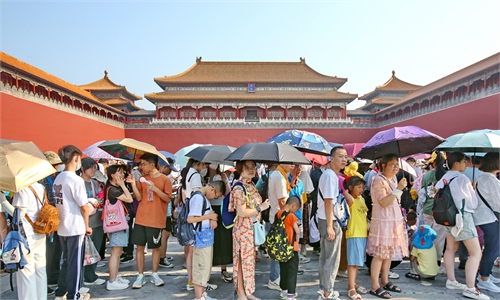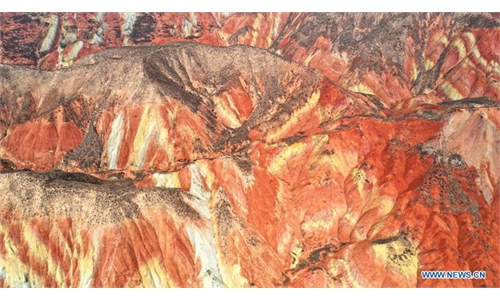IN-DEPTH / IN-DEPTH
A journey to cool: Chinese tourists flock to Changbai Mountain to escape rolling heatwave
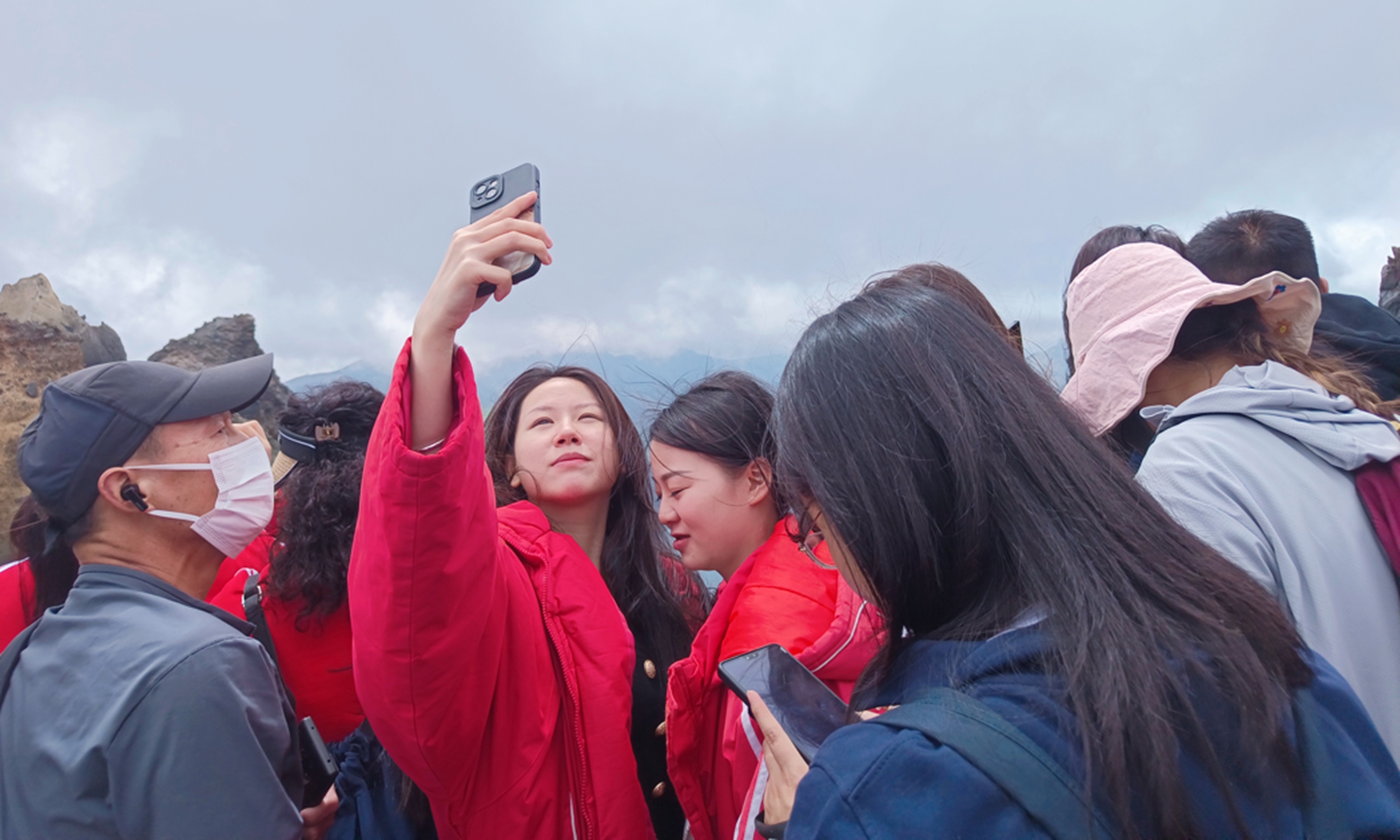
Tourists take a selfie on the Main Peak of Changbai Mountain on July 25, 2023. Photo: Zhang Yaoyu
Among the numerous tourist destinations in China, a couple surnamed Wang from Yantai, Shandong Province, have set their sights on the Changbai Mountain. "It's cooler up north, and upon arrival, we discovered that not only is the air quality good here, but the water is also clean."
In the hot summer, the temperature in many cities has exceeded 30 C, and in some cases even 40 C. Under the low flying clouds, Changbai Mountain, a summer resort located in Northeast China's Jilin Province, still refuses to shed the dimly silver yarn. The water surface of Heavenly Lake, also known as Tianchi, in Changbai Mountain has just begun to break the ice and melt after more than 200 days of frozen. Compared with the dry heat in the city, the comfortable "cool" here has precisely spawned the "heat" of tourism.
As the temperature rises, the ice on the Tianchi Lake gradually thins, breaks up and melts, and the water also reveals its turquoise appearance.
"So beautiful! Changbai Mountain has always been my heart to punch the clock, fresh air, magnificent landscape, worth the trip," said Wang.
Changbai Mountain is one of the ten most famous mountains in China. Every December, the crater lake Tianchi will begin to freeze , the lowest temperature reaches minus 44 degrees Celsius, until the ice melts around the middle of June of the next year. With the frozen Tianchi Lake ice begins to melt, Changbai Mountain ushered in the summer tourism peak.
As of July 20, 2023, the number of visitors to Changbai Mountain Nature Reserve has exceeded one million, surpassing the one million mark seven days earlier than in 2019, the Global Times learned from the Management Committee of the Changbai Mountain Conservation and Development Zone on Tuesday.
The influx of tourists has not only driven the local tourism economy but also brought more challenges and opportunities for ecological protection and scenic area development.
Breathtaking wonderland
The Changbai Mountain scenic area is located in the northeastern part of China, spanning across the border of Jilin Province and North Korea. It is a vast and picturesque region known for its stunning natural beauty and diverse ecosystems.
The centerpiece of the scenic area is Changbai Mountain, also known as Mount Baekdu in Korean. It is an active volcano and the highest peak in northeastern China, standing at an impressive height of 2,744 meters. The mountain is covered in snow for most of the year, creating a breathtaking winter wonderland.
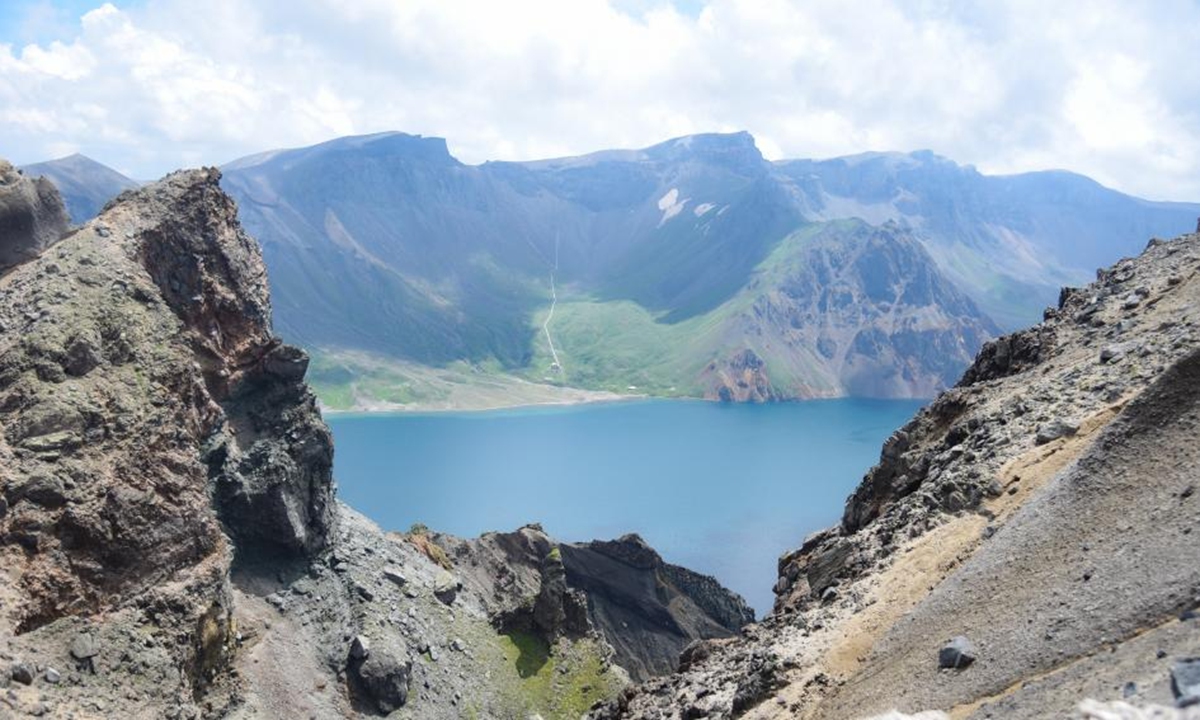
Changbai Mountain Tianchi Lake. Photo: Li jinsha
One of the most famous attractions within the Changbai Mountain scenic area is the Tianchi Lake. It is a crater lake formed by volcanic activity and is renowned for its crystal-clear blue waters. Surrounded by lush forests and snow-capped peaks, the lake offers a serene and tranquil atmosphere.
The scenic area is also home to numerous waterfalls, hot springs, and alpine meadows and is rich in biodiversity, with a wide variety of flora and fauna. It is home to rare and endangered species such as the Siberian tiger, red-crowned crane, and Korean pine.
To gear up for tourism boom in peak season, Changbai Mountain scenic area has completed upgrades and renovations in various areas to create a comfortable and safe tourism consumption environment for visitors.
Bao Gang, deputy manager of the Management Committee, told the Global Times that in the past month, the staff of Changbai Mountain have carried out large-scale repairs and renovations on the plank roads in preparation for the peak tourist season. Currently, the refurbished plank roads are open to visitors, providing a comfortable experience for sightseeing.
Han Quan, in his 30s, stood out this recruitment process and joined the driver team at the scenic area. During the training period of over a month, Han gradually adapted to the altitude and local environment. With the guidance of experienced drivers, he gained a deep understanding of the driving routes and can complete a one-way trip within the designated 16-minute time frame.
To effectively alleviate the pressure of tourist flows during the peak season, the management committee limits the ticket sales, and guides tourists to use online booking system and make scheduled entry with different time slots.
"The management committee never blindly increases the limit in pursuit of economic benefits Overtourism would not only exert negative impact on the experience of visitors, but also cause environmental degradation and ruination of fragile natural habitat," Bao said.
Transformation of small towns
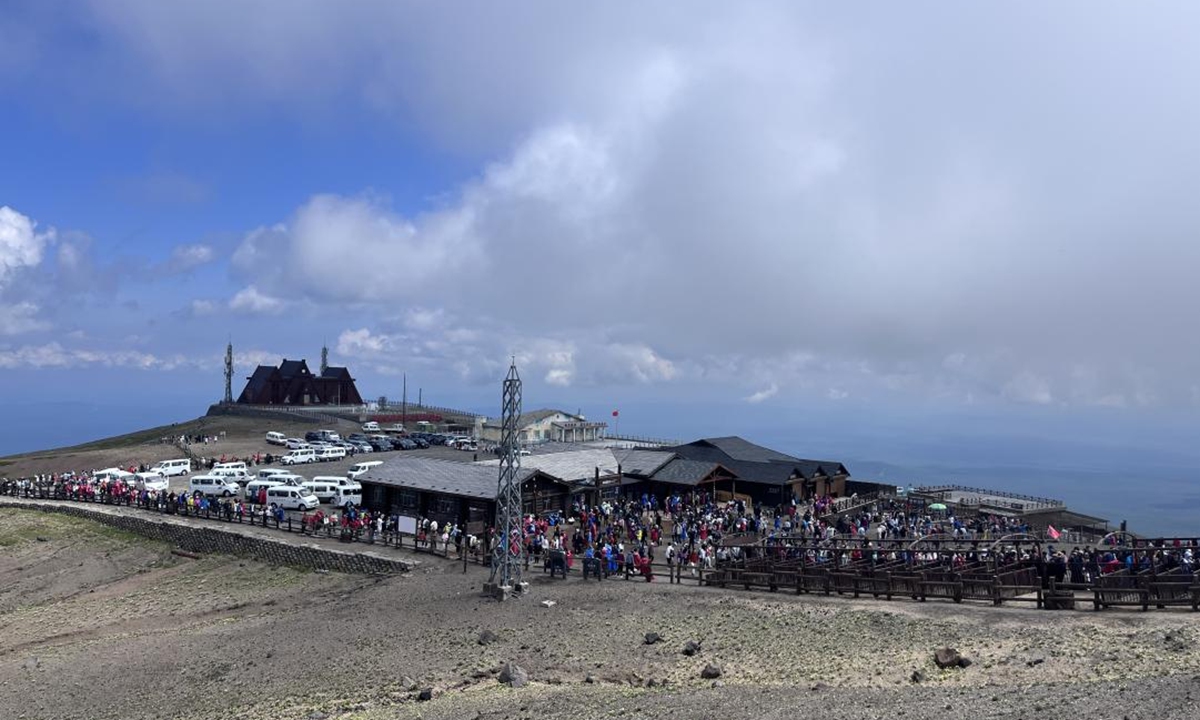
Changbaishan main peak visitor interchange center. Photo: Zhou Qian
With its natural scenery, rare species, and folk culture, Changbai Mountain has gained nationwide recognition and attracted tourists from all over the world, leading to changes in the small town Erdaobaihe and improvement in the living standards of its residents.
Sun Minzhong, who lives in Erdaobaihe town, used to be a taxi driver. About 10 years ago, he passed the assessment in the public recruitment conducted by the Changbai Mountain Tourism Management Committee and became a shuttle bus driver at the scenic spot. During each peak tourist season over the past decade, he has driven the specially customized off-road shuttle bus up and down the mountain more than 10 times a day. Through this process of transporting tourists while enjoying the beauty of Changbai Mountain, he has developed a unique attachment to the mountain.
According to his recollection, Erdaobaihe town relied heavily on logging as a source of income many years ago, with many residents making a living as forestry workers. In the Forestry Culture Park in Erdaobaihe town, people can still sense the scenes of workers engaging in forest logging, sawing, lifting, and transporting from the standing bronze statues.
However, now "relying on the mountain for sustenance" has taken on a new meaning. Protecting the forest and developing the tourism industry have become a consensus among more and more residents, and the tourism boom has attracted an increasing number of people from outside settle in the town.
With active policy guidance, a favorable investment and business environment, and breathtaking natural scenery, the catering and homestay industries in Erdaobaihe have rapidly developed, and their capacity to accommodate tourists has gradually increased.
More and more ordinary people like Sun have found ways to improve their quality of life, whether as drivers, forest protection officers, tour guides, homestay staff, or scenic area managers.
When talking about the development of his hometown, Sun is full of gratitude and hope. "Without Changbai Mountain, I wouldn't have this job. When the high-speed railway to Shenyang is completed, there will be even more tourists coming here."
'We become Changbai Mountain people here'
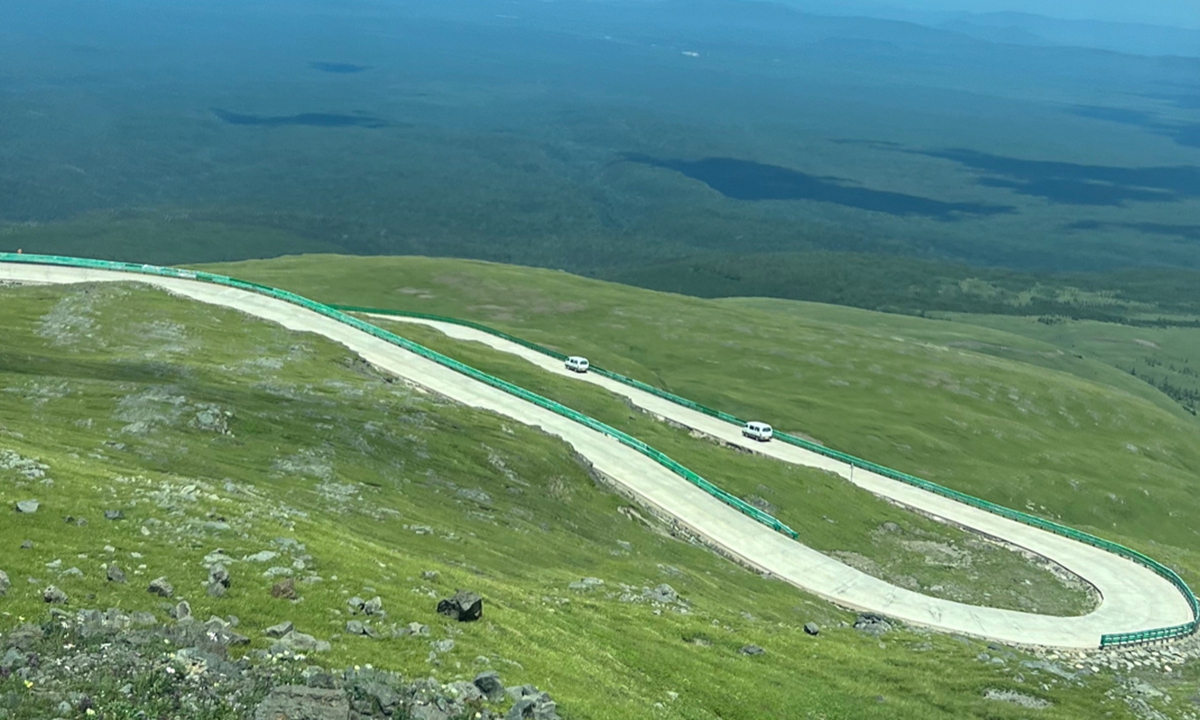
Ring road of Changbai Mountain Photo: Kang Huaishuo
Sustainable development serves as the foundation for ecological tourism at Changbai Mountain. The management committee emphasizes ecological protection while promoting ecological tourism and prioritizing ecological conservation.
Starting from 2019, the Changbai Mountain Nature Reserve and 12 small hydropower stations in the surrounding area were all dismantled. This move not only alleviated the road traffic pressure in the northern scenic area but also protected the local ecological environment.
In 2022, efforts were made to strengthen coal pollution control, ensuring that four centralized heating companies meet emission standards.
From past to present, one of the most noticeable changes is that the management area of private vehicles has extended to the foot of the mountain. In 2021, the northern section of the Changbai Mountain scenic area relocated its entrance gate to the tourist distribution center in Changbai Mountain Legendary Town, located in the Chibei District. Along the 45-kilometer route from the tourist distribution center to the transfer center in the scenic area, private cars are no longer allowed in this area. Instead, tour buses with a capacity of up to 50 people are taking visitors to their destination. These changes not only alleviate the traffic pressure and reduce waiting times for the visitors, but also minimize human interference with the surrounding environment.
"In the past, people used to say that they had to take train to visit our hometown. Now we have highways, high-speed trains, and air routes. This proves that Changbai Mountain's tourism development has been recognized in recent years," Bao, who graduated from university in 2007 and entered the industry, sees no distinction between outsiders and locals. "We all become Changbai Mountain People here."
According to Bao, there exists a dynamic balance between the maintenance of the ecological environment and human activities. On one hand, the ecological environment requires not only the efforts of scenic area staff but also the adherence to proper visitor behavior by every tourist. On the other hand, a good environment will also encourage tourists to cherish the natural wonder.
On the road departing from the nearby Erdaobaihe town, the Global Times reporter saw wild ducks, deer, and other wildlife, feeling that the harmonious co-existence between humans and nature has already taken shape.
The Global Times learned from the management committee that relying on the advantages of border scenery and folk culture, the management committee will focus building an industrial system for border trade and developing themed tourism such as ecological tourism, hot spring health preservation, summer retreats, and winter ice and snow activities.
"We not only want everyone to see Changbai Mountain during the peak summer tourism season but also want to showcase the beauty of Changbai Mountain throughout the year," said Bao.
Zhou Qian, Chen Zihan, Ji Jiaxin, Xiang Yi, Zhang Yaoyu, Kang Huaishuo from Communication University of China contributed to the story

